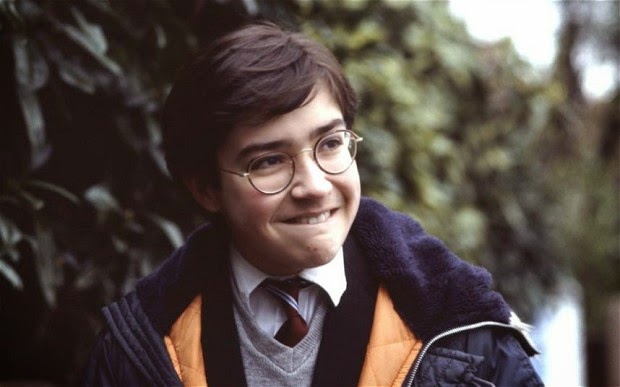My fifteen year-old
self is lying on his bed. In front of him, spread out across the duvet, a
collection of binders and barely legible hand-written history notes. My mum
pops her head through the door: “Are you revising? Your exams are only a week
away.” She’s a teacher, so this kind of behaviour is not unexpected. Fifteen
year-old me sighs as dramatically as he can, before assuring the retreating
face that, yes, I’m getting stuck in.
As the door closes
behind her, he reaches under the canopy of school work, and extracts a
dog-eared copy of The Growing Pains of Adrian Mole. It’s been read so many
times that the binding has all but given up. The pages have been carelessly
jammed back between the covers, like a half-written manuscript in an Oxford
Don’s leather satchel. Young me looks at his watch. “I’ve got a good half-hour
before dinner; I can probably finish this and start Secret Diary again,” the
conspiratorial voice whispers inside his head. Revision will have to wait.
Adrian’s on his way to Skegness, and I can’t wait to rediscover the singular
joys of Bernard Porke and the Rio Grande Guest House.
Although there are
other books that may have moved me more; some have even changed my life; none
have maintained as constant a presence as the Adrian Mole diaries. I first met
Adrian when I was about nine. My Grandma had taken the first volume out of the
library, and enjoyed it so much, she allowed me to read it before returning it.
And although I was a few years younger than Adrian, I felt he was a kindred spirit.
Sure, he was pompous and laughably naïve, but we shared a love of the written
word, and a general air of confusion about the way that grown-ups behaved.
Whereas an older
reader might have picked up on the foreshadowing of future events, a standard
device in most epistolary novels, I shared Adrian’s innocence - although even I
could spot Mr Lucas’ intentions before Adrian did. Of course, each time I
revisited Adrian’s diaries, which was a lot in those days since there were only
two volumes to choose from, I’d pick up on more of the detail. The politics of
the time, the complex familial relationships, and the coruscating social
satire, all added fresh layers to every rereading. Adrian was the ideal
commentator on society – all seeing, if not exactly all-knowing.
Aged just 14, he
diligently reported the outcry that occurred when he accidentally delivered tabloids
to the tree-lined middle class avenues, and broadsheets to the council estate,
but expressed surprise at their response: “I don’t know why everybody went so
mad. You’d think they would enjoy reading a different paper for a change.” Neither
did it escape his notice, in True Confessions, that on the day of Andrew and
Fergie’s wedding: “I passed the Co-op where the Union Jack hung upside down,
and the Sikh temple where it was hung correctly.” Tiny moments, that spoke
loudly about the tensions of modern British life.
As the years passed,
Adrian and I both grew up, but never apart. I kept track of his first,
ill-fated move to London. I shared his heartbreak as his beloved Bianca left
him for his stepfather, Martin Muffet. And I delighted in his, albeit short-lived,
success as a TV chef. Crippling debt, appearances on reality TV talkshows and a
particularly threatening swan, all played vital roles in Adrian’s tragicomic
existence.
But, once a diarist,
always a diarist. With his maturity came a newfound awareness of politics, not
least when his fearsomely ambitious old flame Pandora Braithwaite became one of
Blair’s Babes. Even so, his unerring ability to miss the point never seemed to
fail him. Most of the time, his lack of prescience was mined for ironic humour,
but things took a dark turn in Adrian Mole and the Weapons of Mass Destruction.
Having tirelessly campaigned in support of Blair’s war, putting his unwavering
trust in the Labour leader’s integrity, he’s shocked out of his ignorance when
Robbie Stainforth, his son’s best friend, is killed in a bomb explosion in
Iraq. Adrian’s grief is palpable, reflecting a raw anger that we hadn’t encountered
before. Gone were the playful jabs at British politics; in their place, a
profound sense of betrayal.
The last time I saw
Adrian, he seemed to be on the road to recovery, following a gruelling battle
with prostate cancer. Middle-aged and once again separated from another wife,
he seemed to have finally made peace with his life. Able to set aside three
decades of unrealistic aspirations and underwhelming accomplishments, he was
looking forward to life as a grandfather, perhaps alongside Pandora – the one
that never quite got away. And that’s how I’ll chose to remember him, even
though I know he’s gone forever.
He and I were more
alike than I’d perhaps care to admit. But then, wasn’t that always the secret
of his enduring appeal? Adrian Mole truly was an everyman. Reflecting the
frustrations, obsessions and idiosyncrasies of this weird and wonderful nation.
Cataloguing its foibles with alarming precision, and yet managing to
spectacularly miss the point, more often than not. Adrian Mole; a hero in idiot’s
clothing.


No comments:
Post a Comment